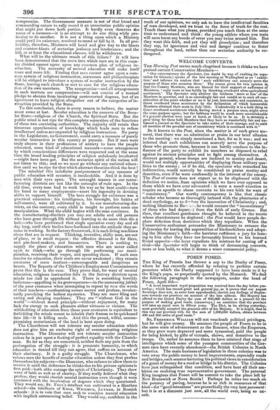WELCOME CONVERTS.
THE Morning Post seems much chagrined because it thinks we have praised certain Conservative Members- " Our contemporary the Spectator, (no doubt by way of exalting its repu- tation for fairness,) speaks of the late meeting at Wallingford as an ' exhibi- tion,' and informs its readers that such exhibitions can scarcely serve the purpose of those who occasion them.' The reason given for this opinion iv, that the County Members, who are blamed for their support or sufferance of Ministers, reply more or less boldly by throwing overboard ultra-agricultural sentiments.' The Spectator only admires the boldness ' more or less' of the Members in question, and is so exceedingly fair and candid as to omit all con- sideration of the point whether or no it be just, honourable, and consistent, to throw overboard those sentiments by the declaration of which honourable Members obtained their seats in July 1841. Undoubtedly it is a bold thing to throw overboard sentiments which, having served a purpose once, might serve the same purpose again ; but the boldness would he much more unmistakeable if a general election were near at hand, or likely to be so. It is cbrtainly a good thing for these bold Members that they have so wonderfully fair and un- biassed a journal as the Spectator to take notice of their courage, and to omit all mention of the peculiar sort of consistency which is combined with it."
Be it known to the Post, since the matter is of such grave mo- ment, that there was no admiration or praise in our brief allusion to the meeting : we simply mentioned a fact, for so it was ; and we inferred that such exhibitions can scarcely serve the purpose of those who promote them, because it can hardly conduce to the in- fluence of the party to exhibit its members so disposed to rebel against its ancient principles and to fight among themselves. A discreet general, whose troops are inclined to mutiny and desert, would not multiply opportunities of displaying those military qua- lities to the enemy ; or if he did, the spectator who remarked his indiscretion, would scarcely be considered to praise mutiny and desertion, even if he were confessedly in the interest of the enemy. The Post of course does not expect us to be displeased with the defection we notice, from opinions which we have ever opposed to those which we have ever advocated : it were a novels exaction to require an apostle to abuse converts to his own faith for want of " consistency." Our worthy contemporary is like that classic scholar who became so thoroughly imbued with the phantasies of a dead mythology, as to deplore the innovation of Christianity ; and, making libations to Baec 'ins, he would censure the "inconsistency" of those who had departed from the faith of early Greece. But then, that excellent gentleman thought he believed in the tenets whose abandonment he deplored : the Post would have people de- plore defection from doctrines which they repudiate. When the Conservative enthusiast persuades the Missionary to censure the Polynesian for leaving the superstition of his forefathers and adopt- ing the Missionary's faith—the barrister cofldemn a jury for lean- ing to bim after they have too favourably listened to his learned friend opposite—the lover repudiate his mistress for casting off a rival—the Spectator will begin to think of denouncing converts, more or less bold, to what it deems a wiser commercial policy.


























 Previous page
Previous page